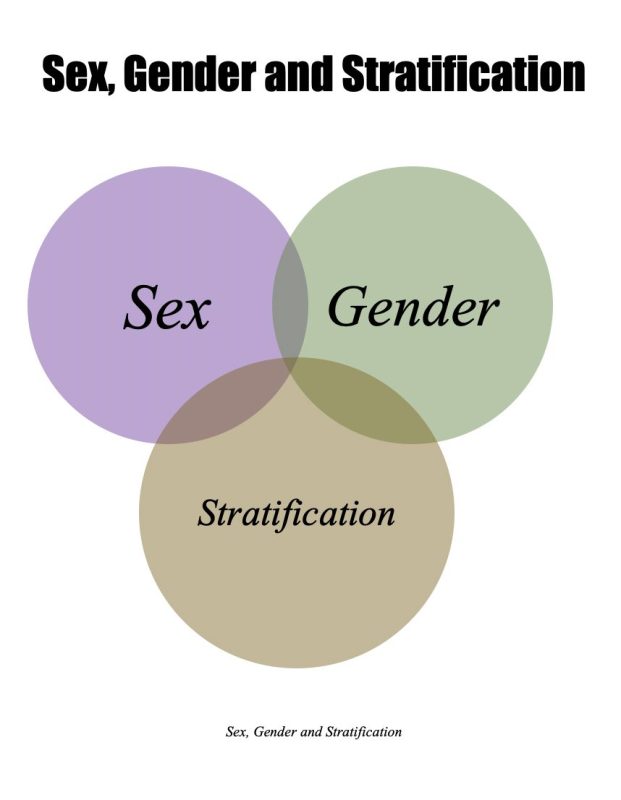Sex, Gender and Stratification
Sex and Gender
Sociologists put forth the disparity that exists between sex and gender, in that sex is built upon a person’s body biology whereas gender is based upon social factors. Individuals associate to conform with the gender that fits with their biological sex hence conducting themselves in ways that are typically appropriate for their gender.
Sociologists Distinguish Between Sex and Gender
Sociologists believe that sex is the physical or physiological distinctions between males and females, which includes the primary sex traits of both the male and female reproductive system and secondary attributes like height and muscularity; on the other hand, sociologists believe that gender is a word used to describe the sociological or cultural differences linked with being male or female stating further, gender identity is the point to which an individual recognizes as being either masculine or feminine.
An individual’s sex, which is a component defined by their body’s biology, does not at all times fit their gender which brings forth the notion that the words sex and gender are not the same and one cannot be used in place of the other. A child delivered with male genitalia would possibly have a male identity, however growing up into adulthood, may recognize the feminine gender of culture. Gender could identify with the opposite identity, however, sex would not since it is biological or physical differences which invariably means that the characteristics of sex will not deviate or change, particularly between distinct human cultures. Typically, individuals of the female sex, even in the face of culture, would ultimately menstruate with breast development and can lactate. Another example is, most cultures have dressing modes that differentiate the male from the female like wearing a gown, tying a wrapper, tying a scarf on the head, etc. is considered feminine in some societies where wearing trousers is the typical dressing considered to be masculine.
With the differences in mind, modern use of gender/sex to large extent appears to lean upon the immediacy of a sociological context or consideration made towards the biology or medicinal context; for most individuals that are biologically or medically modified, sex seemed to be fixed at that point since the reproductive organs determine sex under the diagnosed gametes that the individual possesses or would be expected to possess.
Suggestions that can Help to Lessen the Effects of Gender Stratification in the Workplace
- Development and implementation of diversity: Developing and implementing gender equality in all areas of life such as the family, workplace and another social gatherings would bring to minimum stratification issues in gender, e.g. fair and equal chance of employment regardless of sex or gender, some steps can be taken from the application form by removing the questions which often asks gender of applicants.
- Equal right to education and study what one desires regardless of gender differences, some families or societies believe that some courses are hard and they should be identified with the male gender, giving every gender an equal chance in education would help.
- Provide equal rights to different societal opportunities and roles, such as politics, job opportunities, and public speaking.
- Respect: Implement and advocate respect and acceptance in society to all regardless of gender.
- Creating awareness that advocates gender roles and equality in society through different channels that work towards bridging the gap in terms of understanding, giving every opportunity, and working together would truly help especially in societies or families that believe in gender roles.
- Provide flexible working opportunities, to encourage participation from all individuals regardless of gender.
Impact of Gender Stratification on Both Men and Women
Gender equality is a fundamental human right defiled by gender-based prejudice. Gender difference begins in childhood and has some limitations, especially in some parts of the world causing a lifelong impact that leads to inequality affecting a specific gender more especially girls in some societies like Africa and Asia since the context of gender stratification varies from on society to society and the different part of the world.
Gender stratification refers to the differential ability of men and women to access society’s fundamental resources and to receive their privilege. As gender stratification increases, so do the level of gender inequality, reflecting a higher level of differences between men’s and women’s access to authority and control.
- Education Inequality: Some societies would not let the female gender go to school and even if she does, cannot go past a certain limit, believing the job or role of a woman ends in the kitchen, she is forced into early marriage, women are limited in what they can say in the society. Others include gender violence and child labor which are more specific to gender in different societies.
- Poverty: More stress is laid can be laid on an individual, for example, a male gender would be made to labor more and source food for the family, while the female remains inside the house since the gender stratification puts the male above the female in most societies, the woman cannot go out to work and contribute to the family’s financial need can lead to different issues in the society, pushing the man to labor than expected to provide for the family.
Conclusion
All being said, some sociologists believe that sex is not gender, gender stratification to some extent is not a great idea in society as its impact leads to mental weaknesses such as low self-esteem, exposure to chronic stress, incapacitating an individual’s ability and intelligence, and emotional trauma.



